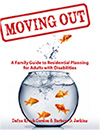
January 15, 2015
The ABLE Accounts are Coming!
By now, you've probably heard that Congress has passed the ABLE Act. ABLE—which stands for Achieving a Better Life Experience—allows people with disabilities to own savings accounts worth up to $100,000 that won't interfere with their government benefits. Here in Massachusetts, you should be able to open an account later in 2015.
ABLE will be very useful for some families. Often I meet with parents who have accumulated thousands of dollars for their children with disabilities using Savings Bonds, gifts from generous grandparents, and bar and bat mitzvah money.
But when their child is approaching age 18 and wants to qualify for SSI benefits—that program has a strict $2,000 resource limit—they have to scramble to reduce the accounts. Closing the accounts and putting the money in their name isn't an option—their child could wait up to three years to get benefits. One solution is to spend the money down until there is only $2,000 left (that's a lot of horseback riding lessons...) but if there is too much money to spend, the only option is to put it into a special needs "payback" trust.
I have written many so-called payback trusts for my clients over the years. The upside is that their children can get SSI benefits immediately at age 18. But there are downsides too—the primary one being that when the child dies and the trust is being closed, the state can demand repayment for the Medicaid benefits it provided over the child's lifetime. (This is the "payback" feature.) Then there is the cost—you have to pay me to prepare the trust—and the hassle of filing the annual income tax returns that are required when the trust earns more than $100 in interest and dividends.
An ABLE account should be a cost-free, convenient alternative to a payback trust. You open an account at a participating bank, credit union, or other financial institution. Your child can put up to $14,000 per year into the account. (There will be modest annual increases in the amount one can deposit.) Depending on your child's age and how much she owns, she may be able to transfer all the money and start receiving SSI checks when she is 18.
You and other family members can also put your own money into an ABLE account. But putting family money into an ABLE account is a BAD IDEA, as I explain below.
The funds in the ABLE account will grow tax-free (that means no income tax returns are required) until they are withdrawn for disability-related expenses like medical care, education, housing, or 1:1 assistance. The money in the account won't be counted against your child who receives SSI benefits until the balance reaches $100,000, at which time the benefits will be suspended until the account is reduced to less than $100,000.
The major downside to ABLE is the payback feature: If your child doesn't spend all the money in the account while she is alive, the government can claim it as reimbursement for her Medicaid bill with the state. There probably won't be any money left for anyone else in the family.
This payback feature is why I can't recommend an ABLE account for a parent who wants to save her own money for her disabled child You are forfeiting the money that your child doesn't spend. Wouldn't you like it to go to other family members?
When it comes to saving money for our special needs children, I like a simple approach: just save money in your own name. If grandparents and other relatives want to give money, have an attorney write a special needs trust. If the money in the trust is not spent while your child is alive, it can go to other family members—no government payback is required.
If you'd like to discuss savings options, SSI benefits, or other legal matters related to your child's disability, you can call my office for appointment. And there is information in my book Legal Planning for Special Needs in Massachusetts: A Family Guide to SSI, Guardianship, and Estate Planning.
Blog Archive:
November 11, 2017
February 3, 2015
Guardians, File your Care Plan Reports: Don't be "Non-complaint!"
January 15 , 2015
7 Hartwell Ave., Lexington, MA 02421
Copyright © 2017 Lexington, Massachusetts


